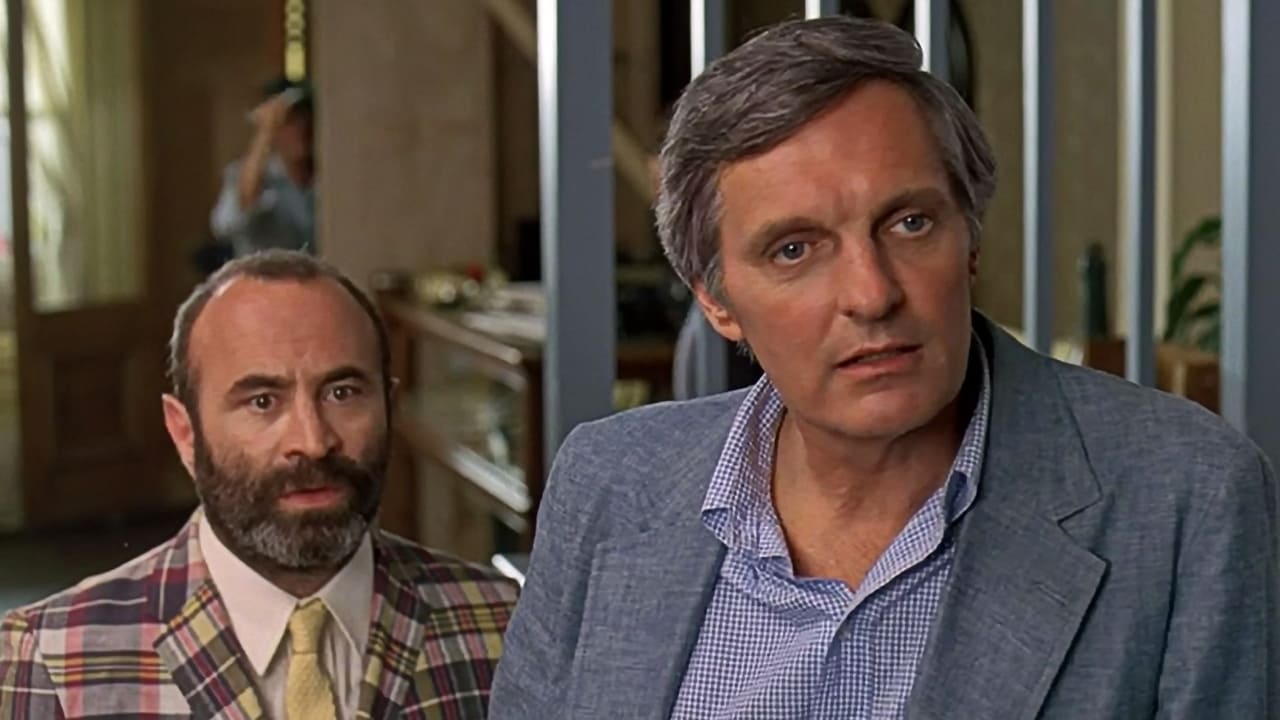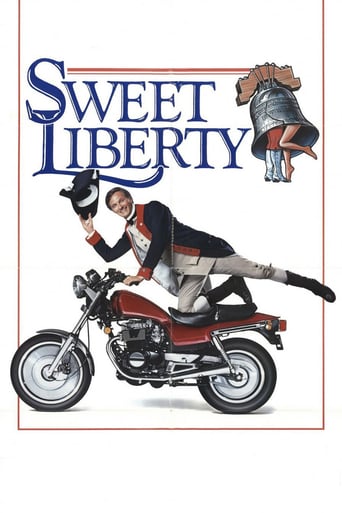

Written, directed, and starring Alan Alda, Sweet Liberty follows, well, Alan Alda as he gets introduced to the wacky world of Hollywood. He plays an author—which foreshadows his real-life accomplishments, since he later wrote three memoirs and became a New York Times bestseller—whose novel is being adapted into a film. Even though he has his hands full with his personal life, when he becomes surrounded by the cast and crew, he learns an entirely new definition of drama.If you like movies about making movies, you'll probably want to rent this one. The lead actors of the film within the film are Michael Caine and Michelle Pfeiffer, and it's always fun to watch beautiful people on the big screen. A ninety-two-year-old Lillian Gish plays Alan's mother, and Lois Chiles and Bob Hoskins join the supporting cast. In general, I find this genre a little too over-the-top in the backstage "drama", and even though I love Michael Caine, this movie didn't really break the mold. But there are some pretty funny scenes, and if you don't take it too seriously, it can be fun with a bunch of your friends and a bowl of popcorn.
... View MoreAlan Alda, still trying to be Hollywood's Everyman, wrote, directed and starred in SWEET LIBERTY,a relatively entertaining comedy about a small town professor who has written a book about what went on his town during the revolutionary war and has sold the film rights. The film chronicles the arrival of the film crew to do the film on location and Alda's exasperation at all the changes they want to make to his book; however, his attitudes toward what they are doing to his book take a back seat when he meets the film's leading lady (Michelle Pfeiffer) who apparently physically resembles the character she is playing to a T but as Alda finds, out is nothing like her. This movie is just so Alan Alda and like all of his movies, the characters all seem to talk and think like Alda but I have come to expect this from an Alda movie after THE FOUR SEASONS. Alda has assembled an impressive cast including Michael Caine as a hammy actor and Bob Hoskins, extremely amusing as the screenwriter who pretends to want Alda's input on his screenplay while seeking his constant approval at the same time. The film does run out of steam before fade out, but Alda and company manage to keep it afloat for most of the ride.
... View MoreThe "making of a Big Hollywood Movie" is certainly not a new idea for a comedy. Over the years there have been many movies like this--most recently David Mamet's "State and Main." What Alan Alda did for this movie is playfully comment on the state of the blockbuster (six years before Robert Altman's "The Player"). In 1986, the "blockbuster movie" was in its early stages. This film originally came out around the same time as Top Gun--case in point. Saul Rubinek plays the obnoxious Hollywood director (what? An obnoxious director?) who turns Alda's historical, and serious, book about the American Revolution into a romantic comedy, complete with big stars who take their clothes off. What makes this movie different from Alda's other films is that there are no serious undertones. Everyone is having a great time, and it shows. Michelle Pfeiffer, in one of her first starring roles, has rarely been funnier. Michael Caine struts his best comic stuff. And Bob Hoskins--how can you go wrong? The film has an obvious mid '80s feel (the music is terrible), and Alda's direction seems more suited for television, but this is still an enjoyable movie, less successful and acidic in its approach to Hollywood and its stars and blockbusters (compared to Sunset Blvd., The StuntMan, and of course The Player) but still worth watching.
... View MoreMichael, a history teacher in a small East Coast town, has written a scholarly book about the American Revolution. Hollywood has decided to turn it into a movie, and cast and crew are descending on Michael's hometown to shoot the location scenes. The author gets a shock when he sees how is work is being revamped for the big screen. Alan Alda wrote, directed and stars in this good-natured romantic comedy. We are in classic Alda terrain here, the unspectacular small-detail world of domestic discord and couples who feel compelled to analyse their love lives. "You buy dishes together," ventures Michael, "and you invite people over. Then you talk about them in the bathroom while you're brushing your teeth." This is the microsmic universe that Alda loves to explore. Michael has three problems, all linked, which are currently exasperating him. Firstly, his aged mother (Lillian Gish) is very dotty and in need of care, something she steadfastly refuses to accept. Secondly, his lover Gretchen (Lise Hilboldt) won't cohabit unless he marries her. Thirdly, the Hollywood company which has come out east to make the film has desecrated his work by turning it into a lightweight (and historically worthless) love story. "I just wrote the book from which the movie has NOT been taken," fumes Michael. Faith Healey (Michelle Pfeiffer) is a method actress and a very big star. When in costume she is in character, even to the point of talking in 'colonial' English offscreen. Michael and Faith become romantically entangled, until Michael realises his mistake. There is no person at the core of the actress - just a creature voracious for the period detail that only Michael can supply. She was playing the part of a lover in order to draw from him what she needed. Elliott James is selfish and shallow, but incredibly charming and enormous fun to be around. A leading man who cares nothing for films, or even other people, he lives his life as one long party. Michael Caine parodies himself, and in the process turns in a commendable performance as the eternal matinee idol. Alda can certainly write. His dialogue always flows beautifully, and his understated characters are utterly believable. When Michael's 'authentic' 18th-century dialogue is spoken, the venerable cadences are gorgeous. Essentially, the film is about the artifice of movie-making. "Who really knows what happened a coupla hundred years ago?" asks the director (Saul Rubinek). The issue is, how far should film-makers go in disregarding historical truth in order to obtain audience approval? Films are, of necessity, separate and distinct from their source material - but in the trade-off between authenticity and popularity, where is the balance to be struck? A New England community such as this one is fiercely proud of its heritage, and indeed very knowledgeable about it. The guys who stage War of Independence re-enactments know in minute detail about the manoeuvres, skirmishes, equipment and ammunition which constituted real events and which form their living culture. It is an affront to these people for ignorant West Coasters to play fast and loose with their sacred lore. In a film about the artifice of film, Alda makes intelligent use of cinema tricks and conventions. Elliott insists on doing his own stunt work - and yet for his triumphant fall into the pond, Michael Caine is doubled by a stunt man. The blizzard scene is shot in glorious New England sunshine. The steadycam revolve shot which marks the romantic climax of the 'film' film is repeated at the romantic climax of 'our' film. With delicious malice, Alda satirises the internal dynamics of cast and crew. Bob Hoskins is the writer with no brains and no class who helps Michael understand the power struggles within the movie's little community, and how best to exploit these envies and vanities in order to get what he wants. Sword fencing is a subtle metaphorical strain running through the film. When we see Michael and Gretchen fencing in the opening scene, the play-fight represents the involvement and the conflict inherent in their relationship. The 'audience' of fencing masks on the wall stands for the public attention to which they will shortly be exposed. Newly-arrived film crew members unload Scottish broadswords, showing from the outset that there will be brash disregard for authenticity. Elliott and Michael sublimate their clash of wills in a protracted sword duel. We are told (and shown) that teenage cinema audiences expect three things in a movie: defiance of authority, destruction of property, and nudity. Alda's film complies with the formula, but also intelligently undermines it. Gretchen's quiet jealousy is excellent, as is Michael's stiff back, expressing vehement disapproval without moving a muscle. A film can stimulate eye, ear and intellect: it doesn't have to follow shallow formulae. If the action climax is a little too smug and convenient, Alda can be forgiven. He is making smart, literate films for grown-ups. Long may he continue.
... View More